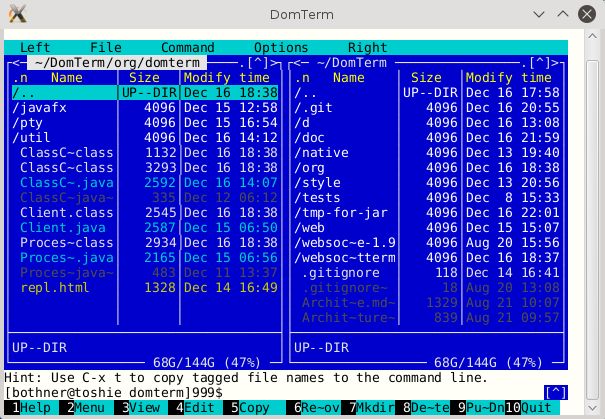DomTerm is an open source terminal emulator, screen multiplexer and REPL console using web technologies (JavaScript and DOM).
Users can type commands which gets sent to an application, which evaluates the command, and displays the results, typically in some kind of type-script format.
We’d love to packages available for more Linux distributions than only Fedora.
Supports:
- qtdomterm, which uses the Qt toolkit and QtWebEngine.
- Electron framework which offers a nicer DomTerm front-end than a regular web browser.
- atom-domterm runs DomTerm as a package in the Atom text editor (which is also based on Electron) and integrates with the Atom pane system.
- A wrapper for JavaFX’s WebEngine, which is useful for code written in Java.
Features include:
- Full-featured terminal emulator using the embedded JavaFX WebEngine browser.
- xterm compatibility. It handles mouse events, 24-bit color, Unicode, double-width (CJK) characters, and input methods.
- Uses a browser engine as a “GUI toolkit”, offering embeddable graphics and links, HTML rich text, and foldable (show/hide) commands.
- Support for session management and sub-windows (tmux and GNU screen), basic input editing (readline), and paging (less).
- Tabs and tiling.
- Detach and reattach to sessions.
- domterm command offers multiple options for controlling or starting a server that manages one or more sessions.
- Mouse support using xterm protocols.
- Save the console file as an offline-readable (x)html-file.
- Pretty-printing (Common Lisp style) is supported. This offers automatic re-flow when resizing a window. It uses special commands to group logical blocks, and attempts to keep the text of a block on a single line with automatic re-flow on window re-size.
- Back-end that displays images, graphics, and rich text.
- Optional input editing. In character mode, each character is sent to the application, like a traditional terminal. In line mode, the browser does the editing, and sends the input line to the back-end when Enter is typed. A history of previous lines is available, accessible with the Up/Down arrow keys. Automatic mode switches between character mode and line mode depending on whether the back-end is in “canonical mode”.
- Built-in pager.
- Smart line-wrapping.
- Supported on Windows Subsystem for Linux (WSL).
Website: domterm.org
Support: GitHub code repository
Developer: Per Bothner
License: 3-clause BSD license

DomTerm is written in JavaScript and C. Learn JavaScript with our recommended free books and free tutorials. Learn C with our recommended free books and free tutorials.
Return to Terminal Emulators | Return to Terminals Built on Web Technologies
| Popular series | |
|---|---|
| The largest compilation of the best free and open source software in the universe. Each article is supplied with a legendary ratings chart helping you to make informed decisions. | |
| Hundreds of in-depth reviews offering our unbiased and expert opinion on software. We offer helpful and impartial information. | |
| The Big List of Active Linux Distros is a large compilation of actively developed Linux distributions. | |
| Replace proprietary software with open source alternatives: Google, Microsoft, Apple, Adobe, IBM, Autodesk, Oracle, Atlassian, Corel, Cisco, Intuit, and SAS. | |
| Awesome Free Linux Games Tools showcases a series of tools that making gaming on Linux a more pleasurable experience. This is a new series. | |
| Machine Learning explores practical applications of machine learning and deep learning from a Linux perspective. We've written reviews of more than 40 self-hosted apps. All are free and open source. | |
| New to Linux? Read our Linux for Starters series. We start right at the basics and teach you everything you need to know to get started with Linux. | |
| Alternatives to popular CLI tools showcases essential tools that are modern replacements for core Linux utilities. | |
| Essential Linux system tools focuses on small, indispensable utilities, useful for system administrators as well as regular users. | |
| Linux utilities to maximise your productivity. Small, indispensable tools, useful for anyone running a Linux machine. | |
| Surveys popular streaming services from a Linux perspective: Amazon Music Unlimited, Myuzi, Spotify, Deezer, Tidal. | |
| Saving Money with Linux looks at how you can reduce your energy bills running Linux. | |
| Home computers became commonplace in the 1980s. Emulate home computers including the Commodore 64, Amiga, Atari ST, ZX81, Amstrad CPC, and ZX Spectrum. | |
| Now and Then examines how promising open source software fared over the years. It can be a bumpy ride. | |
| Linux at Home looks at a range of home activities where Linux can play its part, making the most of our time at home, keeping active and engaged. | |
| Linux Candy reveals the lighter side of Linux. Have some fun and escape from the daily drudgery. | |
| Getting Started with Docker helps you master Docker, a set of platform as a service products that delivers software in packages called containers. | |
| Best Free Android Apps. We showcase free Android apps that are definitely worth downloading. There's a strict eligibility criteria for inclusion in this series. | |
| These best free books accelerate your learning of every programming language. Learn a new language today! | |
| These free tutorials offer the perfect tonic to our free programming books series. | |
| Linux Around The World showcases usergroups that are relevant to Linux enthusiasts. Great ways to meet up with fellow enthusiasts. | |
| Stars and Stripes is an occasional series looking at the impact of Linux in the USA. | |
